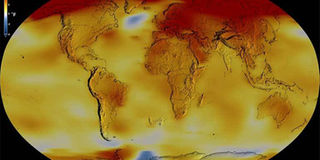Prime
2019 was the warmest year since 1950 – report

Uganda National Meteorological Authority (UNMA) has revealed that 2019 was the warmest year on record since 1950.
What you need to know:
- The southern and western parts of the country were found to be warming up faster than other regions, the report states.
- Mr Isaac Mugume, the director in-charge of forecasting services at UNMA, said the general warming trend observed in the last five years brought serious implications to both individuals and to the economy at large.
Uganda National Meteorological Authority (UNMA) has revealed that 2019 was the warmest year on record since 1950.
The other warm years were 2009, 2017, 2016, and 2015.
This information was disclosed in a report titled, ‘The State of Climate of Uganda in 2019, data,’ which was released yesterday by Mr David Elweru, the acting executive director of UNMA, at a media briefing in Kampala.
“The intention of this report is to give an oversight following a change in the recent weather patterns,” Mr Elweru said.
The southern and western parts of the country were found to be warming up faster than other regions, the report states.
Some of the districts affected include Bushenyi, Kanungu, Kibaale, Kiruhura, Kisoro, Kabarole, Mbarara, Ntungamo, Rukungiri, Ibanda, Isingiro, and Mbarara, among others.
The report did not, however, include information of 2020 and 2021.
This, according to Mr Alex Bob Ogwang, the director in-charge of training and research at UNMA, is because “collected material of 2020 is still under review while the 2021 data is still being collected until the end of December 31”.
He attributed the rise in temperature in the last five years to global warming (a steady increase in the earth’s average temperature) caused by various human activities including deforestation and industrialisation.
Emissions from vehicles and planes have also contributed to the problem.
Mr Isaac Mugume, the director in-charge of forecasting services at UNMA, said the general warming trend observed in the last five years brought serious implications to both individuals and to the economy at large.
“The warmness has distorted the breeding cycle of mosquitoes, hence, introducing such a huge malaria burden,” Mr Mugume said.
He added: “But also, the trend has affected leisure activities like sunbathing as well as distorted agricultural activities and for this reason hindering the flowering and fruition periods.”
The trend has also affected activities on Mountain Rwenzori in south-western Uganda. A case in point is the water coming from the mountain has reduced.
Ms Margaret Nankya Sserwanja, the manager in-charge of training and research at UNMA, said the rainfall patterns have also been affected.
“We are moving away from the normal seasonal changes. The changes are becoming more persistent. There were (weather) patterns that were consistent in the past but now have changed. For a long time, we have known that the rainy season starts in March and ends around May, but, you may have noticed that lately, the rain patterns can be erratic. It can start raining in February and then continue to June, which was previously a dry season,” she said.
Ms Serwanja urged people to take weather forecasts seriously so that they can be able to plan accordingly
Dr Godwin Ayesiga, the principal meteorologist at UNMA, said: “We need to plant more trees that will help absorb carbon dioxide emissions that are causing global warming.”




